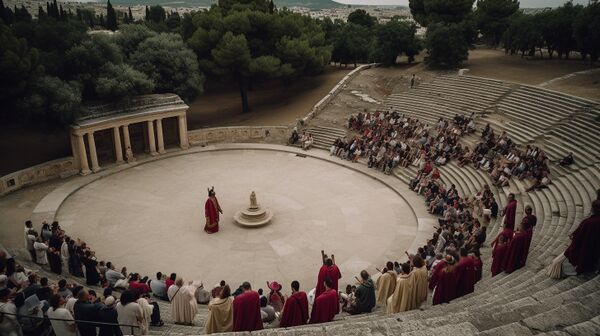(Update. Added links.) |
(Added mimesis.) |
||
| Line 10: | Line 10: | ||
; ''[[w:Hamartia|Hamartia]]'': The tragic flaw or mistake that leads to the downfall of the tragic hero. | ; ''[[w:Hamartia|Hamartia]]'': The tragic flaw or mistake that leads to the downfall of the tragic hero. | ||
; [[w:Hubris|Hubris]] : Hubris, excessive pride, arrogance, or overconfidence which often leads to the tragic hero’s downfall. | ; [[w:Hubris|Hubris]] : Hubris, excessive pride, arrogance, or overconfidence which often leads to the tragic hero’s downfall. | ||
; [[w:Mimesis|Mimesis]] : The imitation or representation of reality in art, a concept central to Greek Tragedy. | |||
; [[w:Theatre of ancient Greece#Orchestra|Orchestra]] : The circular space in front of the stage in ancient Greek theaters where the chorus would perform. | ; [[w:Theatre of ancient Greece#Orchestra|Orchestra]] : The circular space in front of the stage in ancient Greek theaters where the chorus would perform. | ||
; ''[[w:Peripeteia|Peripeteia]]'' : A sudden reversal of fortune for the tragic hero, often leading to their downfall. | ; ''[[w:Peripeteia|Peripeteia]]'' : A sudden reversal of fortune for the tragic hero, often leading to their downfall. | ||
Latest revision as of 07:16, 7 April 2023
Understanding these terms is essential for appreciating and analyzing Greek Tragedy, as they are the key literary and dramatic conventions of the genre. From the tragic flaw of the hero to the emotional release experienced by the audience, each element contributes to the enduring impact of Greek Tragedy on Western culture. This glossary gives only an overview of the terms; further research is always encouraged.
- Anagnorisis
- A moment of realization or discovery by the tragic hero, leading to a deeper understanding of their plight.
- Catharsis
- The emotional release or purification experienced by the audience at the end of a tragedy.
- Chorus
- A group of performers who would comment on the action of the play and provide insight into the characters and themes.
- Deus ex machina
- A literary device in which an unexpected event or character is introduced to resolve a seemingly unsolvable problem.
- Greek Tragedy
- A genre of drama that originated in ancient Greece and deals with tragic themes, often featuring a hero or heroine who experiences a downfall due to their tragic flaw.
- Hamartia
- The tragic flaw or mistake that leads to the downfall of the tragic hero.
- Hubris
- Hubris, excessive pride, arrogance, or overconfidence which often leads to the tragic hero’s downfall.
- Mimesis
- The imitation or representation of reality in art, a concept central to Greek Tragedy.
- Orchestra
- The circular space in front of the stage in ancient Greek theaters where the chorus would perform.
- Peripeteia
- A sudden reversal of fortune for the tragic hero, often leading to their downfall.
- Skené
- The building behind the stage in ancient Greek theaters that served as a backdrop for the action and provided a space for actors to change costumes.
- Tragic hero
- The protagonist of a tragedy who is of noble birth and possesses a tragic flaw, leading to their downfall.
